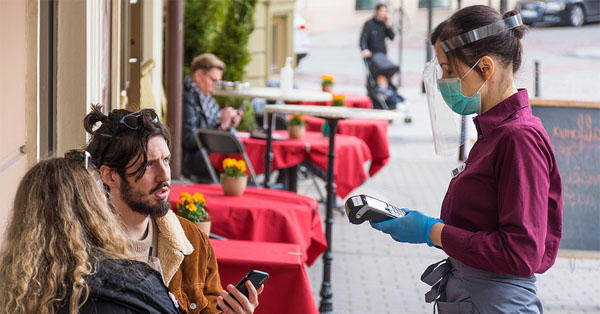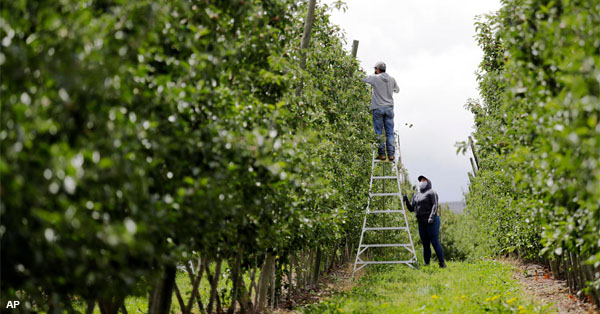NEWS ROUNDUP
Show some respect | Will the transition be just? | Quick fix: pay more
Wednesday, May 26, 2021
COVID-19
► LIVE from the Seattle Times — Coronavirus daily news update, May 26 — The latest count of COVID-19 cases in Washington totals 430,415 infections (7-day average of new infections per day: 983) and 5,722 deaths. Vaccination: 48.88% of Washington residents have received their first dose; 40.75% are fully vaccinated. But AP reports that federal vaccine doses (DoD and VA) are not included in Washington state’s count.
► From KING 5 — Fred Meyer, QFC drop mask mandate for fully vaccinated people in Washington — Fully vaccinated customers no longer need to wear masks at Fred Meyer and QFC in Washington unless it’s required by a local mandate. King County Health Officer Dr. Jeff Duchin issued a health directive last week strongly urging people to continue wearing masks in indoor settings regardless of vaccination status.

EDITOR’S NOTE — Respect grocery workers by staying masked while shopping. You’re in there for just 20 minutes, but these essential workers are exposed for 8-10 hours a day. And now, that exposure includes unvaccinated people who flout the “honor system” and go unmasked. As NPR reported, the United Food and Commercial Workers union has serious concerns about the updated CDC guidelines upon which Kroger based its decision:
“While we all share the desire to return to a mask-free normal, today’s CDC guidance is confusing and fails to consider how it will impact essential workers who face frequent exposure to individuals who are not vaccinated and refuse to wear masks,” UFCW International President Marc Perrone said. He noted that essential workers are often “forced to play mask police for shoppers who are unvaccinated and refuse to follow local COVID safety measures. Are they now supposed to become the vaccination police?”
► From the (Everett) Herald — Trusting a mask ‘honor system’ for unvaccinated (editorial) — COVID-19 is on the decline generally, but not so for the unvaccinated, even as mask rules are relaxed. Washington state is one of four states showing COVID-19 case spikes among the unvaccinated that are above the national average. “Things are getting safer for those who are vaccinated,” said Washington state’s secretary of health, Umair A. Shah, told The Post. “For those who are unvaccinated, they remain at risk. We have to make sure that nuanced message is getting to our community.”
THIS WASHINGTON
► From the AP — Some agriculture groups upset with Inslee over continuing farmworker COVID rules — Some top agriculture groups are upset with Washington Gov. Inslee because farm workers were not covered in last week’s announcement that fully vaccinated employees do not have to wear a mask or socially distance at work. The current rules require fully vaccinated farm workers to wear masks in off hours. They also limit the use of bunk beds to shelters housing no more than 15 workers, which reduces capacity in company housing.
► From the AP — Washington asks state high court to uphold tax on big banks — The state Attorney General’s Office on Tuesday asked the state Supreme Court to uphold a new tax on big banks, a year after a lower court judge sided with the industry in finding it unconstitutional. The 1.2% business and occupation surtax was approved in 2019 and applies to banks that make more than $1 billion in annual profits, but it is assessed only on their economic activity in Washington state. Lawmakers said they designed the measure to begin to fix Washington’s regressive tax system by raising revenue from businesses most able to pay.
RACIAL JUSTICE
 ► From Q13 — Washington AG to announce whether officers will be charged in death of Manuel Ellis — State Attorney General Bob Ferguson’s office will announce a charging decision in its review of the death of Manuel ‘Manny’ Ellis on Thursday, May 27. Ellis, a 33-year-old Black man, was killed in Tacoma police custody March 2020. Ellis was put into a chokehold and restrained by several officers while in police custody on a residential street in Tacoma. An investigation later determined he told officers at the scene that he couldn’t breathe.
► From Q13 — Washington AG to announce whether officers will be charged in death of Manuel Ellis — State Attorney General Bob Ferguson’s office will announce a charging decision in its review of the death of Manuel ‘Manny’ Ellis on Thursday, May 27. Ellis, a 33-year-old Black man, was killed in Tacoma police custody March 2020. Ellis was put into a chokehold and restrained by several officers while in police custody on a residential street in Tacoma. An investigation later determined he told officers at the scene that he couldn’t breathe.
► From Crosscut — 3 Washington families on how new police laws could have helped their loved ones — The state’s new accountability laws might not have happened without the advocacy of people whose family members were killed by police.
The Stand (May 25) — Confronting racism is organized labor’s work (by April Sims) — One year after George Floyd’s murder, we are making progress in Washington state to reshape policing and engage our members on racism.
► From the Spokesman-Review — The tale of critical-race theory and the bullied Boise State student falls apart (by Shawn Vestal) — If you’re caught up on the way that the Critical Race Theory freakout is operating – as a catch-all culture-war tagline and racist dog-whistle for folks who likely couldn’t define it – you’ll recognize this pattern: an anonymous tale emerges of a white student being “bullied” in a classroom discussion on racism, and conservative lawmakers respond by trying to stomp on academic freedom, hush up bothersome talk about racism, cancel diversity as an educational value and enforce a distorted history of a glorious white America.
LOCAL
► From the Peninsula Daily News — Employers chafe over lack of workers — Employers in Clallam and Jefferson counties are begging for workers, with some forced to offer hiring bonuses for hourly wage jobs while COVID-19 restrictions ease and the economy opens up.
EDITOR’S NOTE — Forced to pay more money to attract workers? Dear God, what’s next? Employers forced to provide health care benefits?
► From the Seattle Times — Zeeks Pizza chain underpaid delivery drivers, lawsuit says — Zeeks Pizza, a popular restaurant chain with 19 Western Washington locations, withheld wages, tips and other money owed to delivery drivers, according to a proposed class-action lawsuit filed Monday.
THAT WASHINGTON

► From E&E News — The power struggle over tomorrow’s solar workers — If the Biden administration ends up creating solar jobs for hundreds of thousands of Americans, who will train the workers? What might at first seem an inconsequential question has become a Washington power struggle with consequences for President Biden’s energy agenda and job creation across rural America. On one side are most of the companies that build rooftop solar and big solar farms. They are poised to create hundreds of thousands of jobs but have for the most part shunned union labor. On the other side are labor unions, which have Biden’s promise that tomorrow’s clean energy jobs belong to them. The high-stakes conflict is playing out in Congress as it fleshes out Biden’s plan to spend $100 billion to create a zero-carbon grid by 2035.
► From the Washington Post — Bipartisan group of senators prepares new infrastructure plan as talks stall between White House and GOP — A small bipartisan group of senators is privately sketching out the contours of a new infrastructure package — and fresh ways to pay for it — that the lawmakers hope to sell to colleagues after negotiations between Republican senators and the White House stalled in recent days.
► From the AP — GOP senators ready $1T infrastructure counteroffer to Biden — Senate Republicans revived negotiations over President Joe Biden’s sweeping investment plan, preparing a $1 trillion infrastructure proposal that would be funded with COVID-19 relief money as a counteroffer to the White House ahead of a Memorial Day deadline toward a bipartisan deal.
► From The Hill — Democrats start putting GOP on notice as patience runs thin — Democrats are warning Republicans that they won’t keep waiting around for potential bipartisan deals, as congressional leaders face growing pressure to go-it-alone on their agenda.
 ► From the Washington Post — Biden administration reins in street-level enforcement by ICE as officials try to refocus agency mission — At the detention centers and county jails that the Trump administration once filled with immigrants facing deportation, thousands of beds are now empty. The Immigration and Customs Enforcement officers that President Donald Trump lavished with praise have far less to do on the streets of U.S. cities these days. Under new Biden administration rules curtailing immigration enforcement, ICE carried out fewer than 3,000 deportations last month, the lowest level on record. The agency’s 6,000 officers currently average one arrest every two months. ICE under President Biden is an agency on probation.
► From the Washington Post — Biden administration reins in street-level enforcement by ICE as officials try to refocus agency mission — At the detention centers and county jails that the Trump administration once filled with immigrants facing deportation, thousands of beds are now empty. The Immigration and Customs Enforcement officers that President Donald Trump lavished with praise have far less to do on the streets of U.S. cities these days. Under new Biden administration rules curtailing immigration enforcement, ICE carried out fewer than 3,000 deportations last month, the lowest level on record. The agency’s 6,000 officers currently average one arrest every two months. ICE under President Biden is an agency on probation.
► From The Hill — Schumer tees up vote on Jan. 6 commission bill — The move will allow Schumer to hold a vote on the bill before the Senate leaves for a week-long Memorial Day recess at the end of the week, though he hedged slightly on Tuesday night as a “potential vote this week.”
► From HuffPost — Joe Manchin, Kyrsten Sinema beg GOP to support bipartisan Jan. 6 commission — The two filibuster defenders issued a statement pleading with Republicans to establish a commission to investigate the Jan. 6 riot at the U.S. Capitol.
► From Politico — McConnell, the minority leader with ‘veto’ power — Senate Minority Leader Mitch McConnell is betting the filibuster, and therefore his power over Biden’s agenda, is here to stay.
 ► From Roll Call — Senate confirms Clarke to lead DOJ Civil Rights Division — The Senate on Tuesday confirmed Kristen Clarke as the first Black woman to run the Civil Rights Division at the Justice Department, where she is expected to take an aggressive stance on issues such as discriminatory voting rights laws and policing. The 51-48 vote fell mostly along party lines.
► From Roll Call — Senate confirms Clarke to lead DOJ Civil Rights Division — The Senate on Tuesday confirmed Kristen Clarke as the first Black woman to run the Civil Rights Division at the Justice Department, where she is expected to take an aggressive stance on issues such as discriminatory voting rights laws and policing. The 51-48 vote fell mostly along party lines.
► From the AP — Mad about high gas and lumber prices? Turns out Joe Biden isn’t to blame after all — Heading into the Memorial Day travel weekend, House Republican leader Kevin McCarthy and other members of his party are falsely blaming President Joe Biden for higher gasoline and lumber costs.
NATIONAL
 ► From The Guardian — Amazon workers are rising up around the world to say: enough (by Valter Sanches, Christy Hoffman and Casper Gelderblom) — Amazon, the world’s most powerful corporation, is an iceberg. Users and consumers see its top: the shops, the streaming service, the packages. But below the surface lies an enormous infrastructure, stretching across continents, linking production, distribution and delivery. A complex transnational system, populated by workers around the world whose labor drives Amazon’s profits. Its chief executive and founder, Jeff Bezos, the world’s richest man, tries to conceal this system with the comfort and entertainment his services offer. The reason is equally clear and outrageous. From the factories where the products it sells are made, to the doorsteps where they are delivered, Amazon’s global infrastructure is held together by the exploitation of those who operate it.
► From The Guardian — Amazon workers are rising up around the world to say: enough (by Valter Sanches, Christy Hoffman and Casper Gelderblom) — Amazon, the world’s most powerful corporation, is an iceberg. Users and consumers see its top: the shops, the streaming service, the packages. But below the surface lies an enormous infrastructure, stretching across continents, linking production, distribution and delivery. A complex transnational system, populated by workers around the world whose labor drives Amazon’s profits. Its chief executive and founder, Jeff Bezos, the world’s richest man, tries to conceal this system with the comfort and entertainment his services offer. The reason is equally clear and outrageous. From the factories where the products it sells are made, to the doorsteps where they are delivered, Amazon’s global infrastructure is held together by the exploitation of those who operate it.
► From Grocery Dive — Kroger reaches deal with unions to shore up worker retirement benefits — Fred Meyer and QFC workers belonging to four local unions have ratified an agreement with Kroger to transfer approximately $400 million in pension liabilities from an underfunded plan to the UFCW Consolidated Pension Plan, the grocer announced Friday.
► From Jacobin — Trader Joe’s put workers like me at serious risk during the pandemic (by Erica Mildner) — Central to Trader Joe’s corporate image is the idea that it is a vaguely progressive alternative to corporate grocery chains. But my time working at Trader Joe’s during the COVID-19 pandemic exposed how little the chain cared about the safety of workers like me.
EDITOR’S NOTE — The best way to protect your safety — and paycheck — at work is to form a union! Get more information about how you can join together with co-workers and negotiate a fair return for your hard work and better working conditions. Or go ahead and contact a union organizer today!
TODAY’S MUST-READ

► From HuffPost — Why people don’t stay in restaurant jobs — Republicans blame unemployment benefits, but there’s a simpler reason: the jobs are hard and they don’t pay great. The median pay of a restaurant worker in 2020 was $11.63 per hour, according to the Bureau of Labor Statistics, which at 40 hours a week comes out to a little more than $24,000 per year. That’s less than half the overall median wage for American workers. So it’s not a huge surprise that the average amount of time someone spends in a job is consistently lower in food service than any other industry, at about two years.
The Stand posts links to Washington state and national news of interest every weekday morning by 10 a.m.






